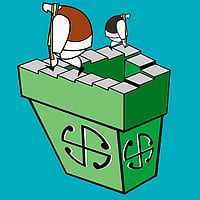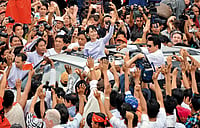Mian Nawaz Sharif has been elected prime minister of Pakistan twice, first in 1990, then in 1997. Both times, his term was cut short by the army. The first time around, he was persuaded to resign. The second time, he was ousted in a military coup. A doughty fighter, he returned dramatically to oust Musharraf himself.
From a business family with huge interests in the iron and steel business, Sharif is naturally inclined towards free market economy and free trade. Although cut up with Asif Ali Zardari’s opportunism and personal ambition, he’s supporting the present government’s move to improve trade ties with India. Bharat Bhushan met him for a freewheeling interview, sipping the delicious green and spicy Bun Harrari Arabic coffee, which Sharif says he got addicted to in exile in Saudi Arabia.
Do you support the opening up of India-Pakistan trade?
This is a very positive development and I think this should have happened much earlier. We are neighbours and we should live as good neighbours. Trade liberalisation has happened after a long delay. Now we should not allow anyone to hamper the movement forward. My party has already lent its support to the government on improving trade ties with India.
Will the PML(N) continue supporting better trade links and relations if it comes to power in the 2013 general election? And would your position be any different, if the voters were to put you in the Opposition?
If you examine the developments of the late 1990s, you would find that it is our party which laid the foundation for trade with India. In the 1997 general election, our party did not try to mobilise voters on an anti-India plank. There was no India bashing in that entire election campaign. In fact, my slogan was for better relations with India. I told people that we needed to sit down and discuss all our bilateral issues. Prime Minister Atal Bihari Vajpayee came to Lahore on my invitation and we signed the historic Lahore Accord. It was a manifestation of our determination to improve ties with India and we were fully supported by the people of Pakistan. In fact, people wanted to know why we were not resolving all the outstanding issues. I asked Prime Minister Vajpayee when he intended to resolve the rest of the issues between India and Pakistan. He said let 1999 be the year when we solve all our outstanding problems. This was in September and by December that year he wanted to resolve all issues. I was determined to go ahead. But then you know what happened.
How difficult was the situation for you when India tested its nuclear devices in 1998?
Once India tested, it was difficult for us not to have responded. President Bill Clinton was asking me not to test. If we went ahead, he said, his hands would be tied and he would have to impose sanctions. I told him that I understood his point of view but that like him I too had to take into consideration what the people of this country wanted me to do. If India had not tested, we also would not have. But we have got into this unfortunate arms race for the last 60 years. We should have competed with each other on economic development and in the social sector to improve the lot of our people, but no, we went for the arms race. There is a need for us to sit down and come to an understanding on not fighting wars against each other and divert our resources to tackle our poverty.
How do you see the state of Pakistan’s politics today? Where is it headed?
Nawaz Sharif: This is a government which has no sense of direction. Its agenda when it came into power was very different. Asif Ali Zardari has betrayed the trust we placed in him time and time again – when we signed the Murree declaration to reinstate the judges, and again when he sought our help in moving the impeachment motion against Musharraf. We were part of a coalition government but were forced to choose the Opposition benches after repeated betrayals. He promised to reinstate the judges sacked by Musharraf not once but twice. He told me that he would not be a candidate for the presidency but announced his candidacy the very day Musharraf stepped down. Then he removed our government in Punjab by suspending the provincial assembly and imposing Governor’s rule. He even got me disqualified by his kangaroo courts. He has no sense of national priorities. He does not address the biggest problems we face – electricity shortage, huge losses in the state enterprises, massive evasion in tax collection, growing unemployment and illiteracy. In just four years this government has taken loans equal to the total Pakistani debt of last 60 years. We have never seen this kind of corruption in public life. Now even the Supreme Court has ruled that Commerce minister Amin Fahim is corrupt. Earlier he was found guilty of corruption in another case and had to return money to the government. That is why I say that this is a government which does not know where it is going.
To what extent does the Army still continue to be the fulcrum of politics in Pakistan?
I think the Army is mostly confined to it professional duties today. That is the good thing that has happened despite the poor performance of the current government. Earlier, the Army would have taken advantage of such a situation. Today it is confining itself broadly to its constitutional role.
Does this mean that in all these years, through all the ups and downs, a pressure has built on the military establishment to cleanse itself of ambitious elements seeking a political role?
Everyone in this country is learning lessons from history. I have learnt from my mistakes. I want Mr. Zardari to also do so but he refuses to learn the lessons he ought to. And I hope the military establishment has also learnt the right lessons.
How would the Army react to your coming back to power?
Frankly, I have nothing against the army. I am opposed only to extra-constitutional action. Had we not deviated from the democratic path in the last 60-65 years, we would have been much better off. This is the realisation that has come to our civil society, political parties and our citizens. But it also needs to percolate to all levels of our armed forces. I would say that an overwhelming majority in the army realises this. I am sure that when Musharraf and his cronies took extra-Constitutional steps in 1999, they did not have the support of the majority of the armed forces personnel.
What influence do the Islamist militant groups like the Difa-e-Pakistan Council have on government policy?
You have a diversity of parties in every country and Pakistan is no exception -- some are Right, some Left, some Liberal and some Conservative. But they have to respect the Constitution and the law of the country – within that they can do anything. There is freedom of speech in this country, an independent judiciary and a strong civil society is emerging. So you cannot control or confine anyone.
What should be Pakistan’s option in Afghanistan after the US draws down its troops in 2014? What kind of Afghanistan would be in Pakistan’s interest?
Pakistan’s option should be to support the people of Afghanistan – be friendly towards the people and not take sides so that Pakistan is regarded as friendly country. When I was the prime minister, my policy was not to take sides. A neutral Afghanistan would be ideal. The best thing for us would be to first put our house in order and only then worry about putting someone else’s house in order.
How do you see China’s role in Pakistan? Do you see it increasing over time?
China is a great friend of Pakistan and it is an old friend. Of course, we have we good relations and we doing a lot of things together in many areas including industrialisation of Pakistan. Our endeavour has always been to strengthen these bonds. It is an all-weather friendship.
A shorter, edited version of this appears in print
























